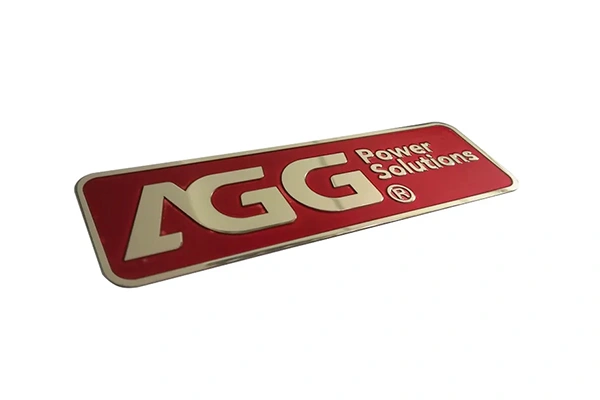Himgo delivers high-quality, cost-effective metal nameplates for you.
The Complete Guide to Engraved Metal Labels — Types, Applications & Customization Tips

[ez-toc]
What Are Engraved Metal Labels and Why They Matter?
Engraved metal labels are durable identification plates designed to convey critical information that must remain legible throughout a product’s lifespan. Unlike printed labels, which may fade, peel, or degrade over time, engraved labels offer permanent marking etched directly into the metal surface. They are essential in industries that demand traceability, safety, and regulatory compliance.
In modern industrial environments, labels face heat, abrasion, chemicals, and UV exposure. For these reasons, engraved metal labels are the preferred choice for equipment identification, asset management, and branding.
According to ISO 7000 Pictograms, clear and durable labeling is a core requirement for safety and compliance in industrial environments.
At Himgo, we specialize in manufacturing engraved metal labels that maintain clarity and integrity even under the most demanding conditions.
![]()
Understanding the Engraving Process for Metal Labels
Engraving is the process of cutting or etching text and graphics into the metal surface to create a permanent mark. There are two main engraving methods used in modern manufacturing:
Laser Engraving – Uses focused laser energy to vaporize the metal surface with precision. Laser engraving allows fine details and barcodes, ideal for aluminum and stainless steel labels.
Reference: ScienceDirect — Laser Engraving of Metals
Mechanical Engraving – A rotary or diamond cutter physically etches the surface. This method is common for deep marking applications where high contrast and depth are needed.
Engraving depth typically ranges from 0.001 to 0.015 inches, depending on material and application. The result is a mark that resists wear, corrosion, and chemical damage.

Best Materials for Engraved Metal Labels: Aluminum, Stainless Steel & Brass
Choosing the right material is crucial to label longevity. Each metal offers distinct advantages:
Aluminum
Lightweight, cost-effective, and corrosion-resistant. Ideal for indoor and mild outdoor use.
Material reference: ASTM B209 — Aluminum and Aluminum Alloy Sheet Standard
Stainless Steel
Offers superior heat and chemical resistance. Best for industrial and marine environments where labels must withstand abrasion and cleaning agents.
Brass
Known for a distinct aesthetic and oxidation resistance, brass is common in luxury or decorative applications where appearance matters as much as durability.
Where Engraved Metal Labels Are Used
Engraved metal labels are applied in a wide range of industries that require traceability and safety marking:
Aerospace and Defense – Aircraft components, control panels, and inventory tracking.
Automotive and Machinery – Engine plates, VIN tags, and machinery identification.
Oil & Gas / Energy – Outdoor and harsh environments requiring corrosion resistance.
Medical Equipment – Sterilization-resistant ID plates with laser engraved serial codes.
Electronics and Telecommunications – Equipment ID and safety warnings on enclosures.
External Reference: OSHA Labeling Guidelines define label durability and legibility requirements for industrial safety.
Discover our Industry Solutions for Automotive, Electronics, and Machinery applications.

Customization & Design Options for Engraved Labels
Customization allows you to create labels that fit both functional and branding needs. At Himgo, we offer flexible design options including:
Material Choice: Aluminum, Stainless Steel, Brass, Nickel, Copper
Size Range: From 0.5 × 1 inch up to 8 × 12 inches (custom available)
Surface Finish: Brushed, Polished, Anodized, Matte
Engraving Depth: 0.001 – 0.015 in deep
Additional Features: Barcodes, QR codes, logos, serial numbers, and safety icons
Mounting Options: Adhesive backing, rivets, screws, or magnetic fixing
For barcode applications, see GS1 Barcode Standards.
Explore related custom branding solutions on our Custom Metal Emblems page.
Why Choose Engraved Metal Labels Over Printed Ones
While printed labels offer low initial cost, engraved metal labels provide significant long-term advantages:
Unmatched Durability – Engraved information won’t fade or scratch off over time.
Chemical & Heat Resistance – Engraved marks remain legible under temperatures up to 1,000 °F.
Weatherproof Performance – Ideal for outdoor use with UV and corrosion resistance.
Professional Appearance – Engraving adds depth and quality perception to brand plates.
Long-Term Value – Lower maintenance cost and replacement frequency.
Research Reference: Corrosion Resistance of Engraved Surfaces – ResearchGate
:View lightweight alternatives on our Metal Stickers page.
How to Choose the Right Engraved Metal Label for Your Application
Selecting the right engraved label depends on where and how it will be used. Consider the following factors:
| Criteria | Recommended Option | Reason |
|---|---|---|
| Temperature Range | Stainless Steel or Nickel | Heat & corrosion resistance |
| Outdoor Exposure | Anodized Aluminum or Steel | UV and weather protection |
| Aesthetic Design | Brass or Polished Aluminum | Premium visual finish |
| Chemical Contact | Stainless Steel | Non-reactive surface |
| Mounting Surface | Adhesive / Riveted | Depends on substrate and vibration level |
Reference: UL 969 Labeling Standards define adhesion and legibility criteria for durable labels.
Request a personalized quote through our Contact Page.

Ensuring Quality — Standards and Certifications for Engraved Labels
To guarantee reliability, engraved metal labels must meet industry standards for materials and marking methods.
At Himgo, our production complies with the following certifications:
ISO 9001: Quality Management — Ensures consistent manufacturing and inspection processes.
RoHS Compliance — Guarantees environmentally safe materials.
UL 969 — Defines label performance for adhesion and durability.
ASTM Material Standards — Confirm material purity and thickness tolerances.
External Reference: ISO 9001 Quality Management Certification
: Learn about our Factory Strength and Quality Control capabilities.
Frequently Asked Questions (FAQ)
Q1: What is the difference between engraved and printed metal labels?
Engraved labels have permanent markings etched into the metal surface, while printed labels apply ink on top. Engraving offers superior durability and longer lifespan.
Q2: Which materials are best for outdoor engraved labels?
Stainless steel and anodized aluminum perform best outdoors due to their corrosion and UV resistance.
Q3: Can engraved metal labels include barcodes or QR codes?
Yes, laser engraving can precisely etch 1D and 2D codes used for asset tracking and compliance.
Q4: How long do engraved metal labels last in industrial environments?
Properly manufactured engraved labels can last 15–25 years depending on exposure and material choice.
Start Your Custom Engraved Label Project with Himgo
Engraved metal labels represent the perfect balance between durability, clarity, and professional appearance. Whether you need industrial asset tags, nameplates, or branding plates, Himgo delivers precision manufacturing with strict quality control and competitive pricing.
Our engineering team can assist you in material selection, design optimization, and surface finishing to ensure every engraved label meets your performance needs.
👉 Get Your Free Quote Now →
or contact our sales team for technical support and custom design consultation.




